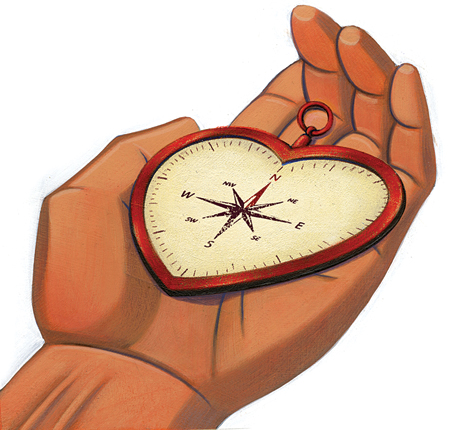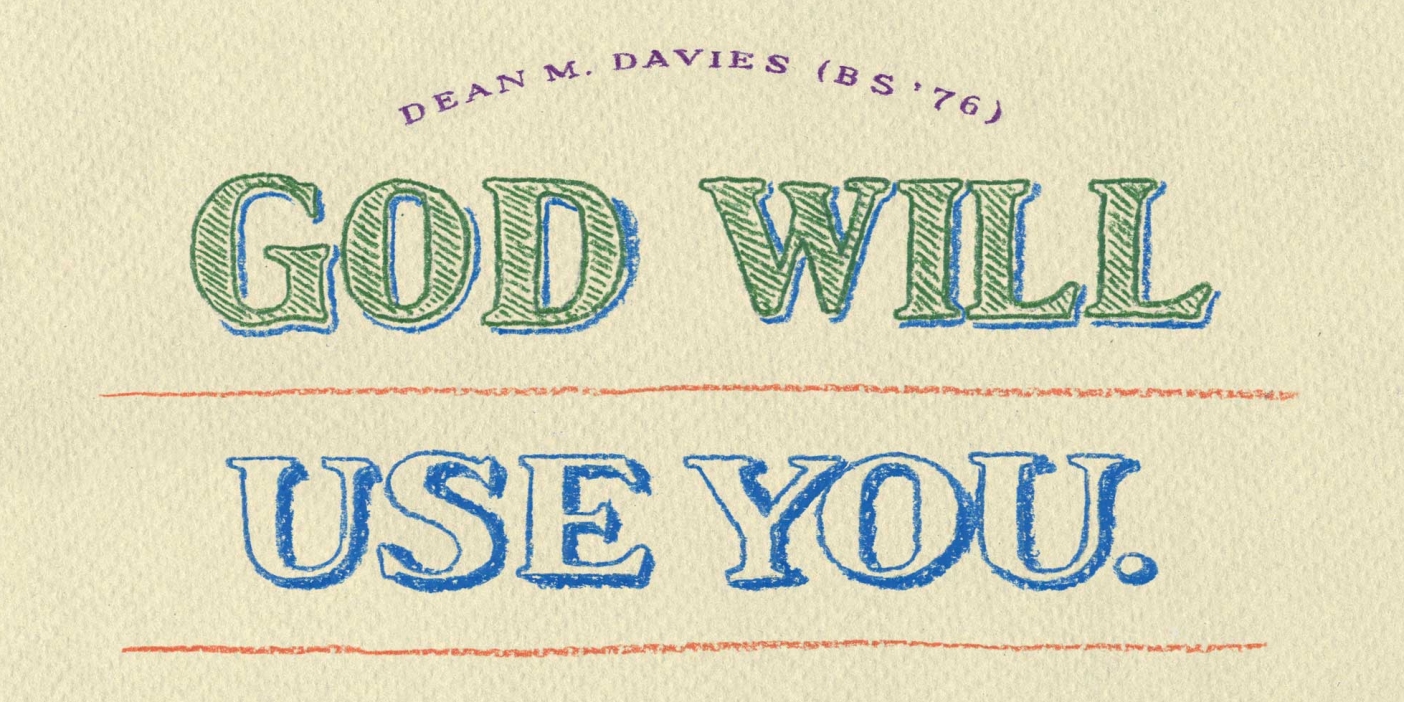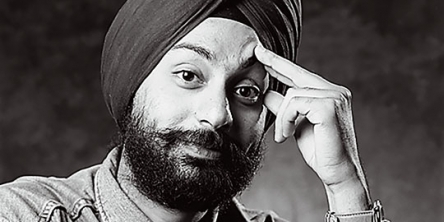When Love is Why
When Love is Why
In the end, why we do things may be more important than what we do. What if love were our only motive?
By Russell T. Osguthorpe (BS ’71) in the Fall 2011 Issue
When I walk across campus at BYU, I like to say hello to as many people as I can. I especially like it if they say hello back. I guess it’s my retro way of doing social networking.

Meeting new people can enrich our lives in miraculous ways. My wife and I recently visited Bucaramanga, Colombia, on a Church assignment. Bucaramanga is a city of 1.2 million very friendly people. In fact, they pride themselves on being the friendliest city on the planet. When we arrived, many were there to greet us. They made us feel as though we were the most important people they had ever met. We had never been to this city before. We had never seen the people who were greeting us. And yet we felt their love.
Love is one of the most powerful positive forces in existence. It is at the heart of one of the strongest statements in all of scripture, which occurs twice in Moroni: “If ye have not charity, ye are nothing” (Moro. 7:46; see also verse 44). No matter how competent we might be—how bright, how talented, how athletic, how attractive, how hardworking—if we are not acting out of love, we are nothing. Those people in Bucaramanga were not thinking of themselves. They were not trying to prove anything to anyone. They were simply reaching out to us in love.
Reaching Out
While teaching a missionary preparation course, I asked students to keep track of key indicators, as they would be doing in the mission field. One of the key indicators was to talk to people. Just saying hi to someone was not enough. They needed to have a real conversation with each new person they met. This assignment did not count toward their grade, but students invested themselves in it with real energy and commitment. Each week they would text or e-mail me their results for the week.
One week a student reported having conversations with 72 people he had never met before. I asked him in class, “How did you do that in one week? How did you visit with so many?”
He responded, “Oh, I was standing in lines a lot this past week, so I would just ask the person next to me to hold my place in the line, and then I would move through the line and introduce myself and talk to as many people as I could.”
I recommend you try this, by the way, because this is what he told me in the end: “You know, Brother Osguthorpe, the surprising thing is that I really think I made some friends I will have the rest of my life.”
Think of that for a minute. All he did was meet people.
There is real power in reaching out to others. Being friendly is a great thing, because it’s the only way we can move from acquaintance to lasting friendship. Several weeks into the semester in my missionary preparation course, I received an e-mail from a student. The e-mail simply said, “I haven’t been coming to class. I don’t know if there’s any way I can still complete the course. Could I come and talk with you?”
I set up an appointment to see him. He came to my office accompanied by his resident assistant, who explained, “I overheard him last night saying that he had never attended his missionary prep class, so I suggested that he e-mail you and come and talk.”
I told the student that he had missed a number of assignments and that he would need to complete each assignment or he would fail the course. I explained that if he would complete all the past assignments, come to every class for the remainder of the semester, turn in all future assignments on time, and successfully complete the final, he could receive a passing grade. The next day he sent me a detailed plan for meeting all the conditions we had laid out. He never missed another class period, handed in every assignment, did well on the final exam, and passed the course. The resident assistant helped him along the way and even attended the first class with the freshman to make sure he had a good experience.
I asked the resident assistant what had motivated him to help this student. He explained, “I made a commitment during my mission that when I returned to BYU, I would help freshmen prepare for their missions.” For the resident assistant, the needs of a freshman took precedence over his own.
I saw that freshman on the sidewalk the following semester. He was with some friends, but he ran up to me and told me that he was about to submit his application to serve a mission. He thanked me for permitting him to complete the course and said, “I don’t know what would have happened if you had not helped me.”
I said, “I didn’t really do anything. It was that resident assistant who made the difference in your life.”

Motives Matter
What if our only motive were love? What if everything we did, we did out of love? There are all kinds of motives out there, and many of them are not pretty. We might be motivated by revenge or envy or greed. Selfish motives are abundant. As students we might be motivated only by grades or by our desire to get into graduate school or to begin a career. These are not necessarily evil motives, but they are not enough. We might get straight As. We might get into the best graduate school. Or we might land the best job offer imaginable. But, as Moroni taught, “If [we] have not charity, [we] are nothing.”
We can even do good things with less-than-laudable motives. Quoting his father, Mormon, Moroni wrote that if we give “a gift, [and] doeth it grudgingly; . . . it is counted . . . the same as if [we] had retained the gift; wherefore [we are] counted evil before God (Moro. 7:8; see also verse 9). In the end, why we do things is probably more important than what we do. Motives matter. They matter a lot. And one of the purest motives of all is love.
So is it possible to do everything we do out of love? Is it possible to study because we love the Lord and His children? Is it possible to be motivated by love when we take a test, read a chapter in a textbook, complete an assignment, or answer a question in class? Is it possible to love someone who has wronged us? Can love be our only motive?
While it’s important to remember that we should not judge another’s motives, we can judge our own. We need to look inside and take stock. Are we doing what we do out of love? Or has some other motive taken over?
We can easily relate to the story of the prodigal son. We have likely all made decisions that led us away from what is good and right. Then, like the prodigal son, we have come to ourselves, woken up, and repented (see Luke 15:17). But we might also relate to the brother of the prodigal son, who resented his brother for all the positive attention he was getting from their father. The father’s only motive was love for both of his sons. He freely forgave the one and eagerly entreated the other to come in and celebrate the return of a family member.
We need a special kind of love to rejoice more in the success of others than in our own. When Alma met Ammon and his brothers following their mission to the Lamanites, Alma rejoiced in his own success, but he rejoiced even more in the success of his brethren: “Now, when I think of the success of these my brethren my soul is carried away, even to the separation of it from the body, as it were, so great is my joy” (Alma 29:16).
When others’ needs start to matter more than our own, and when others’ successes are more exciting to us than our own, we are beginning to experience the kind of love that our Father in Heaven and our Savior have for us. It is a love without dimension. It has no boundaries, no limitations. It is pure, infinite, and eternal. Oh, how I want to have more of this kind of love for others.
Caring Enough
My wife’s brother Steve became less active in the Church at the age of 15 and later married outside the Church. This is how Steve tells his own story:
I was assigned a home teacher. When he called me, I said something like, “I don’t want to be contacted, and my wife is not interested.” He asked if he could at least make contact once in a while and made sure I understood he was there for us if a need arose.
For 22 years, every month, I faithfully received a postcard from that home teacher with a kind thought or just a “hello, hope things are going well for you.” I had never met him for the first 18 years, yet every month he made his home teaching contact the only way he could.
That contact became very important to me when we found out my wife had brain cancer in 1996. We never had children, and so I was the primary caregiver for her during her 23-month illness. I was helped by 12 wonderful women who were friends, neighbors, or coworkers.
One day the ward Relief Society president came by our home to offer help. My wife was asleep at the time, and I didn’t want to wake her, so that visit never happened. But that contact by the Relief Society president was more important to me, I think, as it softened my heart. My wife of 31 years passed away 10 days later.
Following his wife’s death, Steve needed help in planning the funeral. Whom do you think he turned to for that help? To his home teacher of 22 years—the one who had faithfully written all of those cards! How easy would it have been for that home teacher not to complete his calling? Some of us have a difficult time home teaching people who welcome us. But he stayed with it.
Five years later Steve remarried. His second wife was a faithful member of the Church. His pathway back to full activity in the Church began. Last year Steve was ordained a priest and then received the Melchizedek Priesthood—all after 50 years of inactivity.
When we care for someone, we want to do something for them. Steve’s home teacher cared enough to do something—to write literally hundreds of cards to the one he’d been assigned to visit. The Relief Society president cared enough to visit at exactly the right moment for Steve. I’m convinced that there are people all around us who need that kind of caring, that kind of love. All we need to do is open our eyes and our ears and our hearts so that we can know what we need to do for others.
We’ve likely all noticed how our prophet, President Thomas S. Monson, shows his love to others. Following a program in the Conference Center, in which 7,000 youth performed on stage or in the aisles, a 12-year-old deacon sang as part of the finale. Following his song, President Monson motioned to the young man to come to him. The young man made his way off the stage to the front row in the audience, where President Monson was sitting. They greeted each other while everyone in the Conference Center waited in silence. Then the young man went back up on stage and got swarmed by all the other youth in the cast. Everyone wanted to shake the hand of someone who had just shaken the hand of the prophet.
At the end of the evening, President Monson stayed to greet as many young people as he could. We watched as a prophet of God expressed his love to the youth of the Church. At one point he went on stage and shook the hands of each young person in a row of wheelchairs. These were youth with multiple disabilities. Some could not acknowledge President Monson’s handshake with speech, but I am quite certain that each could feel his love.
While serving as an Area Seventy, I once accompanied Elder Russell M. Nelson to a stake conference at which a new stake president was being called. As is the usual practice, we briefly interviewed approximately 30 Church leaders in the stake. Elder Nelson asked the stake clerk to attach a picture of each leader to the leader’s one-page bio. After we had issued the call to the new stake president and his counselors, we had about 45 minutes before the priesthood leadership meeting was to begin. Elder Nelson and I were in the stake president’s office preparing for the next meeting. I was reviewing the message I was planning to deliver, but I noticed that Elder Nelson was going over the bio sheets.
I wondered why he was reviewing the information so carefully. Then, when Elder Nelson stood to speak during the priesthood leadership meeting, I understood. As he taught, he called upon Church leaders by name. He would say, “Brother Johnson, Brother Anderson, would you stand and tell us about how this happens at your ward?” He had never met these leaders before interviewing them for only a few minutes each, but he knew their names. He would likely never see most of the leaders again in his ministry, but he took the time to learn their names.
When I have shared this experience with others, they often say, “Yes, Elder Nelson has a remarkable memory for names.” But where has that skill come from? He cares enough about others to learn their names. Most of us could memorize 30 names in 45 minutes. But many of us may not think to do so.
When love underlies our actions as learners and teachers—as human beings—everything gets better.
Giving Life
The Savior’s earthly ministry was a time of teaching, a time of miracles. He established His Church on the earth. He called the Twelve to become leaders in the Church. He taught everyone who would listen. He healed the sick and raised the dead. Why did He do all these things? He had only one motive—love. His message to us is that we need to be good and do good, but we need to do it for the right reason. This is precisely why the two great commandments are the greatest: “Thou shalt love the Lord thy God with all thy heart, and with all thy soul, and with all thy mind” and “Thou shalt love thy neighbour as thyself” (Matt. 22:37, 39). The motive means everything.
My first mission was in Tahiti. I love the way Tahitians greet each other. The literal meaning of their greeting word—ia ora na—means “life to you” or “that you might live.” We are either giving life or taking life from each other as we move forward on our way.
Harsh words take life away from the one who receives them and even from the one who utters them. But words spoken in love give life. The resident assistant gave life to the freshman and to me as well. The home teacher and Relief Society president gave life to my brother-in-law Steve. President Monson gave life to every young person he greeted in the Conference Center that evening. And Elder Nelson gave life to those Church leaders he called by name. What if all the words we spoke were motivated by love?
The Savior’s life on earth was short, but He reached out in love every step of the way. He helped so many while He was on His way to help someone else. He noticed what others needed, reached out to them, and helped them—sometimes in simple ways and other times in miraculous ways. Every miracle He performed, every word He spoke, He did out of love.

He loved those He taught. He cared for their spiritual well-being, but He also cared for their temporal needs. When they were hungry, He fed them with five loaves. When their souls hungered, He inspired them with the truths of His gospel.
He cared for those who lost their way. He cared enough to find them and bring them home. He never forgot one of His own.
He loved the young. He loved the rich. He loved the poor. He loved the sick. He loved the sinner. He loved all of God’s children. When He saw them suffering, He healed them. When He saw them sorrowing, He lifted them up. When He saw them in pain, He comforted them.
His life on the earth was an example of what it means to do good. But it was also a singular example of what it means to do good for the right reason. Every act of the Savior on earth was done out of love. Even in the great premortal council His offer to the Father was motivated by love for others, while the adversary’s was motivated by selfishness. The Savior’s mission was to give us life by allowing us to choose to love the Lord and follow Him (see Moses 4:1–3). The adversary’s goal was to take away our agency and thereby make it impossible for us to love, because it is impossible to love unless we choose to love. Love must come from within. It cannot be forced upon us. So for purposes of his own selfish aims, the adversary would have made it impossible for us to keep the first two commandments. He would have made us into nothing (see Moro. 7:46).
Christ had a clear mission in mortality. He came to earth to save each of us. He knew how His life on earth would end and how His act of love for us would change everything. Each of us has a clear mission as well, but, like the Savior, we need to remain open to the needs of others we pass along the way. Our calendars should never be so packed that we don’t have room to show love to those around us.
We are studying the New Testament this year in Sunday School. This book of scripture is a story of love—the love of the Father for the Son and the love They have for each of us. We cannot fully comprehend this love, but we can feel it. We cannot fully emulate it, but we can “pray . . . with all the energy of heart” that we might be filled with it (Moro. 7:48). It is a love that transcends all of our mortal experience. It is a love that lifts and builds and strengthens, that calms and comforts us. The only way for us to increase our capacity to love in this way is to feel the love our Father in Heaven and His Son have for us. The more we feel Their love for us, the more we will increase our capacity to share that love with others.
The Savior never stopped teaching us this lesson of love. Among His final words in life were words of love. Even when He was on the cross and ready to complete His mission, He reached out in love to those who were literally taking His life: “Father, forgive them; for they know not what they do” (Luke 23:34). Even when He was suffering more pain than any of us can imagine, He still had love for those around Him, including the very people who were nailing His body to the cross.
The Savior is our example in everything—not only in what we should do but why we should do it. His life on earth was an invitation to us—to raise our sights a little higher, to forget our own problems and reach out to others. I know we are all loved by God the Father and His Son Jesus Christ. Their love is infinite and eternal. I know They live. I bear witness of that. I know They are mindful of our needs. They have called prophets in this dispensation to help us learn what we need to learn to return to Their presence. They have given us the scriptures to guide us. They have given all this because They love us. My prayer is that we will feel that love every minute of every day and that we will share that love with everyone in our path.
Russell T. Osguthorpe is the Sunday School general president of The Church of Jesus Christ of Latter-day Saints, director of the BYU Center for Teaching and Learning, and a professor in the Department of Instructional Psychology and Technology. This article is adapted from a devotional address given on March 8, 2011. The full text is available at speeches.byu.edu.
Feedback: Send comments on this article to magazine@byu.edu




